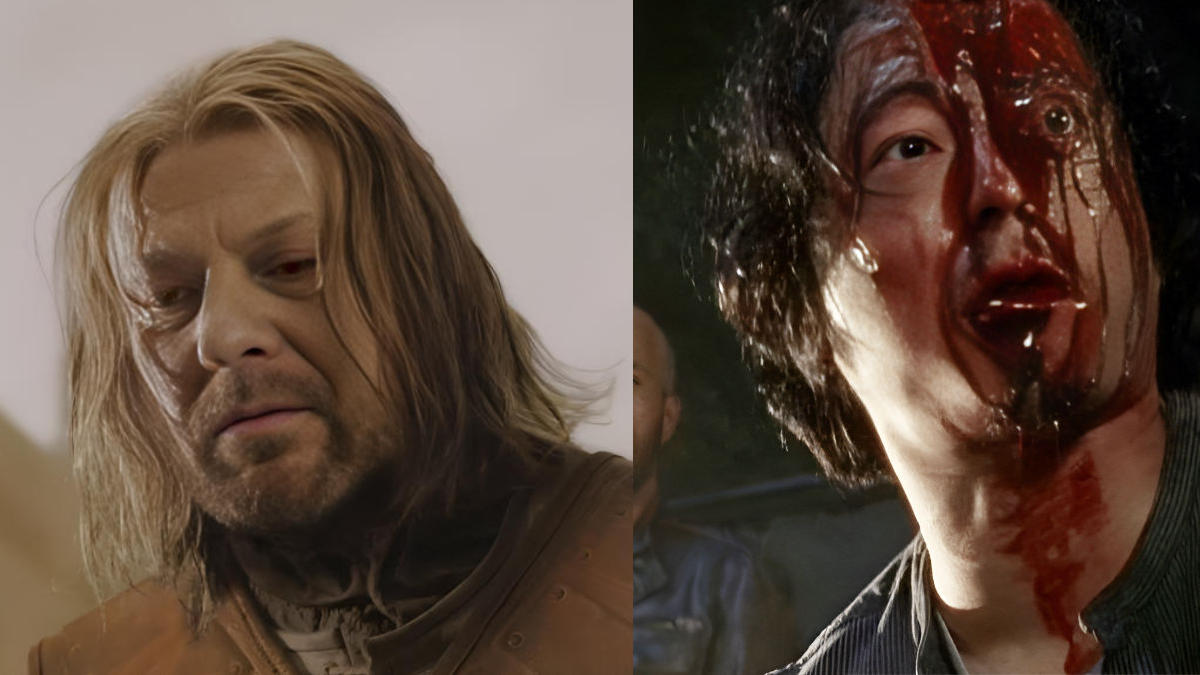Television has always had the power to entertain, surprise, and devastate. But there are moments in TV history that go beyond plot twists, moments that leave viewers stunned, speechless, and emotionally wrecked. These are the character deaths that didn’t just shift the narrative but changed how we look at television forever.
From crime dramas to fantasy epics, these are the 10 most shocking TV character deaths that fans still talk about today, according to public surveys, fan polls, and years of cultural memory.
1. Ned Stark – Game of Thrones (2011)
This death wasn’t just unexpected, it was a cultural earthquake. Played by Sean Bean, Ned Stark was positioned as the hero of Game of Thrones, only to be executed in the very first season. It set the tone for the series and made it clear that no one was safe. Viewers were outraged, shocked, and hooked.
Why it mattered: It broke the traditional TV formula where heroes survive, changing the game for modern storytelling.

2. Adriana La Cerva – The Sopranos (2004)
Adriana’s death in The Sopranos was painful, not because it was unexpected, but because it was inevitable. Her betrayal and subsequent execution by Silvio was haunting, intimate, and heartbreaking.
Why it mattered: It showcased how loyalty and betrayal can coexist in the same breath in mob culture. And fans weren’t ready for it.

3. Will Gardner – The Good Wife (2014)
In what might be one of the most shocking network television deaths in recent memory, Will Gardner was suddenly shot in a courtroom scene. The abruptness and emotional impact had fans reeling.
Why it mattered: It changed the show’s trajectory entirely, and the raw realism made it even more jarring.

Also Read: Most heartbreaking goodbyes! Korean stars who passed away
4. Joyce Summers – Buffy the Vampire Slayer (2001)
When Buffy’s mother dies of natural causes in The Body, it became one of the most painful, grounded, and silent episodes in television. There were no monsters. No supernatural threats. Just death, real, raw, and deeply human.
Why it mattered: It was a turning point for the show, highlighting grief in its most honest form.

5. Glenn Rhee – The Walking Dead (2016)
After surviving countless threats, Glenn’s brutal death at the hands of Negan felt like a betrayal to fans. The scene was graphic, controversial, and emotionally devastating.
Why it mattered: Glenn had become a symbol of hope and humanity in the apocalypse. His death triggered fan outrage and marked a tonal shift for the series.

6. Poussey Washington – Orange Is the New Black (2016)
Poussey’s tragic death during a prison protest was a gut punch. It was eerily reflective of real-life incidents and sparked important conversations around justice, racism, and systemic violence.
Why it mattered: It was one of the most socially relevant character deaths in recent memory, sparking activism and dialogue beyond the screen.

7. Mr. Hooper – Sesame Street (1983)
While not a dramatic death, the passing of Mr. Hooper was deeply emotional. The show chose to address the actor’s real-life death in the series, teaching children about grief with honesty and sensitivity.
Why it mattered: It was one of the first times a children’s show tackled death head-on, making television history.

8. Edith Bunker – All in the Family (1980)
Edith’s quiet off-screen death was felt deeply by fans of All in the Family. Her presence had been a warm, grounding force, and her loss was treated with sincerity and respect.
Why it mattered: It was a reminder that even beloved sitcom characters are not immune to the realities of life.

9. Michael Cordero – Jane the Virgin (2017)
After surviving a near-death experience, Michael’s sudden and final death in Season 3 blindsided fans. The time jump and reveal were bold, but emotionally devastating.
Why it mattered: It flipped the tone of the series and changed the lead character’s emotional arc forever.

10. Logan Roy – Succession (2023)
The death of media mogul Logan Roy was not just shocking, it was brilliant. It happened off-screen and early in the final season, forcing viewers and characters alike to deal with chaos, legacy, and unresolved emotions.
Why it mattered: It cemented Succession as a masterclass in modern storytelling, where power and mortality collide unexpectedly.

Why Do These Deaths Still Matter?
TV character deaths often serve a purpose beyond emotional manipulation. They reflect life’s unpredictability, challenge genre norms, and force both characters and audiences to evolve. In some cases, they ignite cultural conversations; in others, they shift the trajectory of a series entirely.
Whether written for shock value or dramatic depth, these deaths have left an indelible mark on pop culture, and the hearts of millions of viewers.
Kriti Pandey

